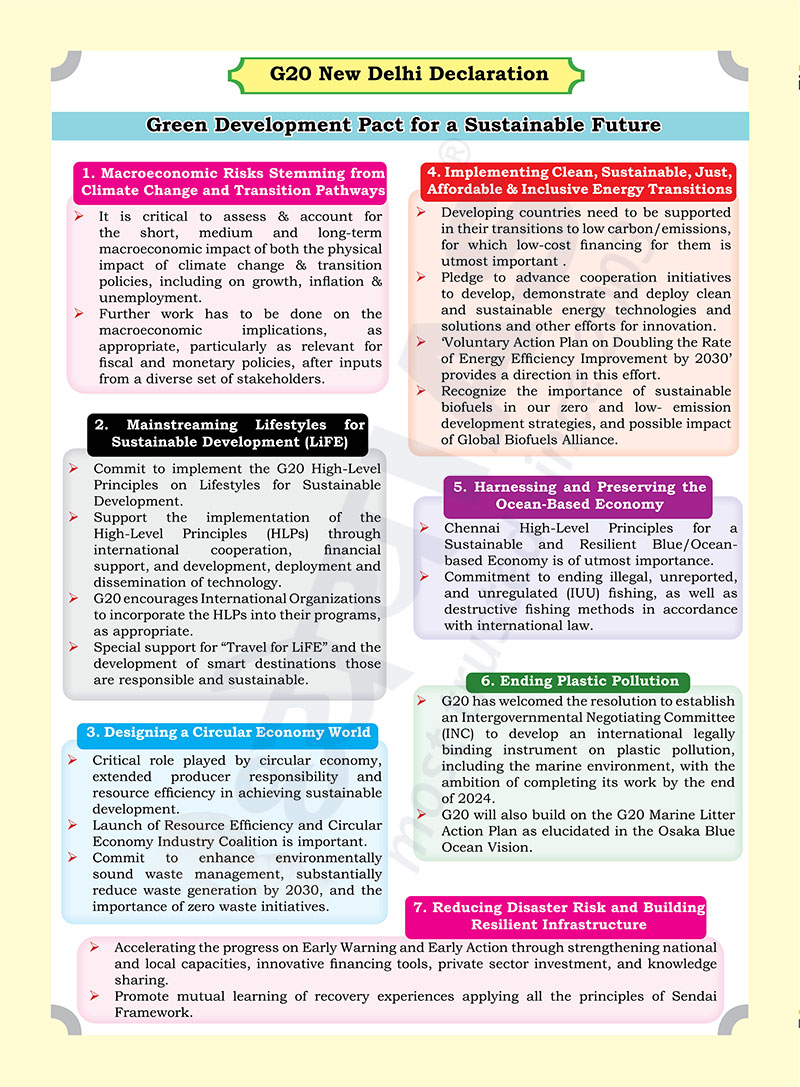Brain-booster
/
19 Oct 2023
Brain Booster for UPSC & State PCS Examination (Topic: G20 New Delhi Declaration : Green Development Pact for a Sustainable Future)

1. Macroeconomic Risks Stemming from Climate Change and
Transition Pathways
- It is critical to assess & account for the short, medium and long-term
macroeconomic impact of both the physical impact of climate change &
transition policies, including on growth, inflation & unemployment.
- Further work has to be done on the macroeconomic implications, as
appropriate, particularly as relevant for fiscal and monetary policies,
after inputs from a diverse set of stakeholders.
2. Mainstreaming Lifestyles for Sustainable Development (LiFE)
- Commit to implement the G20 High-Level Principles on Lifestyles for
Sustainable Development.
- Support the implementation of the High-Level Principles (HLPs) through
international cooperation, financial support, and development, deployment
and dissemination of technology.
- G20 encourages International Organizations to incorporate the HLPs into
their programs, as appropriate.
- Special support for “Travel for LiFE” and the development of smart
destinations those are responsible and sustainable.
3. Designing a Circular Economy World
- Critical role played by circular economy, extended producer
responsibility and resource efficiency in achieving sustainable development.
- Launch of Resource Efficiency and Circular Economy Industry Coalition is
important.
- Commit to enhance environmentally sound waste management, substantially
reduce waste generation by 2030, and the importance of zero waste
initiatives.
4. Implementing Clean, Sustainable, Just, Affordable &
Inclusive Energy Transitions
- Developing countries need to be supported in their transitions to low
carbon/emissions, for which low-cost financing for them is utmost important
.
- Pledge to advance cooperation initiatives to develop, demonstrate and
deploy clean and sustainable energy technologies and solutions and other
efforts for innovation.
- ‘Voluntary Action Plan on Doubling the Rate of Energy Efficiency
Improvement by 2030’ provides a direction in this effort.
- Recognize the importance of sustainable biofuels in our zero and low-
emission development strategies, and possible impact of Global Biofuels
Alliance.
5. Harnessing and Preserving the Ocean-Based Economy
- Chennai High-Level Principles for a Sustainable and Resilient Blue/Oceanbased
Economy is of utmost importance.
- Commitment to ending illegal, unreported, and unregulated (IUU) fishing,
as well as destructive fishing methods in accordance with international law.
6. Ending Plastic Pollution
- G20 has welcomed the resolution to establish an Intergovernmental
Negotiating Committee (INC) to develop an international legally binding
instrument on plastic pollution, including the marine environment, with the
ambition of completing its work by the end of 2024.
- G20 will also build on the G20 Marine Litter Action Plan as elucidated
in the Osaka Blue Ocean Vision.
7. Reducing Disaster Risk and Building Resilient Infrastructure
- Accelerating the progress on Early Warning and Early Action through
strengthening national and local capacities, innovative financing tools,
private sector investment, and knowledge sharing.
- Promote mutual learning of recovery experiences applying all the
principles of Sendai Framework.







